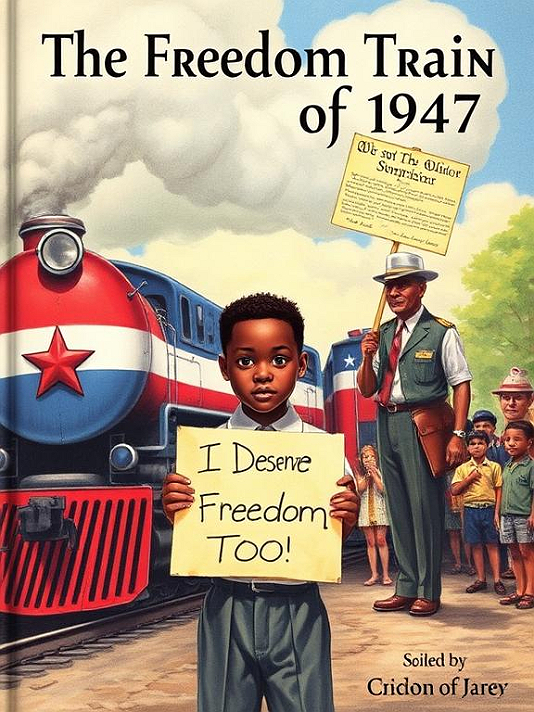Title: The Freedom Train of 1947
Birmingham, Alabama — 1947. Jeremiah Washington was twelve years old the first time he saw the Freedom Train—a gleaming red, white, and blue locomotive that looked like it had rolled straight out of a dream. It was said to carry the very soul of America: the Declaration of Independence, the Bill of Rights, the Emancipation Proclamation. The country was still reeling from the war, and this train was meant to unite everyone.
But not in Birmingham.
At Lamar Station, the Freedom Train was open to whites only. A rope line was drawn. Armed guards stood watch. Black citizens were told they could not board—not even to see the documents that promised their freedom.
Jeremiah had spent weeks preparing. His teacher, Miss Holloway, had led the class through lessons on the Constitution and civil rights. His father, a decorated WWII veteran, had promised to take him.
> "They let me bleed for this flag in Europe," his father said, "but they won't let me show it to my boy back home."
Anger flared in Jeremiah like a lit match. He had written an essay titled "What Freedom Means to Me" and planned to recite it in front of the train. Now, he wasn’t even allowed on the platform.
But Miss Holloway wasn’t finished.
She called for a protest. The next day, Jeremiah and fourteen classmates stood outside the train station holding signs:
"The Bill of Rights is for Everyone."
"We Built This Country Too."
"Let Us See Our Freedom."
The local police tried to disperse them. Reporters snapped photos. One captured Jeremiah holding a sign over his head, tears in his eyes but standing tall.
The picture made it into a Northern newspaper. Letters poured in. Activists called the train’s organizers. Within two months, the Freedom Train revised its rules in several cities, allowing integrated viewings.
Jeremiah never did get to board in Birmingham. But he would go on to attend Howard University, become a civil rights lawyer, and argue cases involving equal access to education.
He kept the protest sign his entire life.
> “We couldn’t ride that train,” he later said, “but we helped lay the tracks for the ones who came after us.” #blacklifematters #blackhistory #socialcommunity
Birmingham, Alabama — 1947. Jeremiah Washington was twelve years old the first time he saw the Freedom Train—a gleaming red, white, and blue locomotive that looked like it had rolled straight out of a dream. It was said to carry the very soul of America: the Declaration of Independence, the Bill of Rights, the Emancipation Proclamation. The country was still reeling from the war, and this train was meant to unite everyone.
But not in Birmingham.
At Lamar Station, the Freedom Train was open to whites only. A rope line was drawn. Armed guards stood watch. Black citizens were told they could not board—not even to see the documents that promised their freedom.
Jeremiah had spent weeks preparing. His teacher, Miss Holloway, had led the class through lessons on the Constitution and civil rights. His father, a decorated WWII veteran, had promised to take him.
> "They let me bleed for this flag in Europe," his father said, "but they won't let me show it to my boy back home."
Anger flared in Jeremiah like a lit match. He had written an essay titled "What Freedom Means to Me" and planned to recite it in front of the train. Now, he wasn’t even allowed on the platform.
But Miss Holloway wasn’t finished.
She called for a protest. The next day, Jeremiah and fourteen classmates stood outside the train station holding signs:
"The Bill of Rights is for Everyone."
"We Built This Country Too."
"Let Us See Our Freedom."
The local police tried to disperse them. Reporters snapped photos. One captured Jeremiah holding a sign over his head, tears in his eyes but standing tall.
The picture made it into a Northern newspaper. Letters poured in. Activists called the train’s organizers. Within two months, the Freedom Train revised its rules in several cities, allowing integrated viewings.
Jeremiah never did get to board in Birmingham. But he would go on to attend Howard University, become a civil rights lawyer, and argue cases involving equal access to education.
He kept the protest sign his entire life.
> “We couldn’t ride that train,” he later said, “but we helped lay the tracks for the ones who came after us.” #blacklifematters #blackhistory #socialcommunity
























